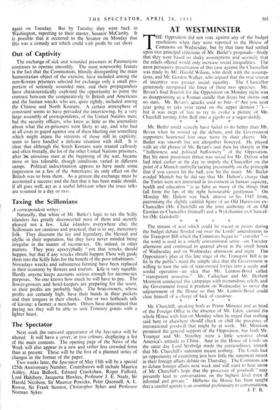Out of Captivity
The exchange of sick and wounded prisoners at Panmunjom continues to operate smoothly. The most noteworthy feature is the fact that the Communists, blandly disregarding the main humanitarian object of the exercise, have included among the non-Korean prisoners selected for exchange only a small pro- portion of seriously wounded Men; and their propagandists have characteristically exploited the opportunity to point the contrast between the comparatively fit British and Americans and the human wrecks who are, quite rightly, included among the Chinese and North Koreans. A certain atmosphere of constraint seems to have pervaded the interviewing, by a very large assembly of correspondents, of the United Nations men; but the security officers, who knew as little as the journalists about what the ex-prisoners were likely to say, and who had at all costs to guard against one of them blurting out something which might injure the interests of those still in captivity, seem to have handled a delicate situation with skill. It is clear that although the South Koreans were treated callously and often brutally, the lot of the other United Nations prisoners, after atrocious start at the beginning of the war, became more or less tolerable, though conditions varied in different camps. Political indoctrination appears to have made some impression on a few of the Americans; its only effect on the British was to bore them. As a gesture the exchange must be accounted a success; and the fact that it has been made should, if all goes well, act as a useful lubricant when the truce talks are resumed in a day or two.


































 Previous page
Previous page